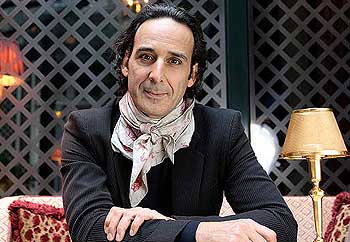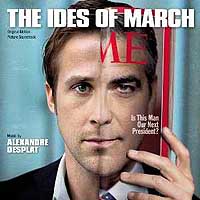 Alexandre Desplat ('The Ides of March')
Alexandre Desplat ('The Ides of March')
'The Ides Have It!'
Four-time Oscar nominee, Alexandre Desplat is one of the most acclaimed composers of his generation. It was his joint passion for music and cinema that led him firmly in the direction of composition for film and to create a new and unique voice in film music.
Under the mixed cultural influence of a Greek mother and a French father who had met and studied in California, he was classically trained as a flautist, but extended his musical interests much further into the worlds of Jazz, Brazilian and African music. As a teenager, Alexandre Desplat spent hours in movie theatres studying the great films and directors of the 20th Century and of course, listening intently to the scores.
In 2003 he burst onto the Hollywood scene with his evocative score to GIRL WITH A PEARL EARRING (starring Scarlett Johansson and Colin Firth), which earned him nominations at the Golden Globes, BAFTAs and European Film Awards. Following this success, Alexandre solidified his position as one of Hollywood's elite composers with his highly respected scores to Jonathan Glazer's BIRTH, Stephen Gaghan's SYRIANA, Stephen Frears's THE QUEEN (in which he received his first Academy Award nomination), John Curran's THE PAINTED VEIL (for which he won a Golden Globe), and, among others, scores for Ang Lee's LUST CAUTION, David Fincher's THE CURIOUS CASE OF BENJAMIN BUTTON and Wes Anderson's THE FANTASTIC MR. FOX.
In 2010, he wrote the score to Tom Hooper's THE KING'S SPEECH, for which he won a BAFTA and was again nominated for an Oscar and a Golden Globe. The same year, he scored David Yates' HARRY POTTER AND THE DEATHLY HALLOWS PART 1 and in 2011 HARRY POTTER AND THE DEATHLY HALLOWS PART 2 which has become the third highest-grossing film of all time. His latest work includes Terence Malik's THE TREE OF LIFE, Roman Polanski's CARNAGE and George Clooney's THE IDES OF MARCH.
Taking it from the top and you grew up in 1960's/1970's Paris, ` France - what was that like for a young boy? "My musical background and training has been very eclectic. I started first as a flautist playing everything from classical chamber music to Jazz, Greek, Brazilian and African music to contemporary concert music. I listened to a lot of the great film composers when I was growing up – Rota, Hermmann and Jarre."
"But I am also influenced by the classical cannon, in particular Mozart, Ravel, Debussy, Messiaen and Takemitsu. These varied musical interests have shaped my work for the big screen. Music for films allows a great deal of diversity and the more you widen your skills, the better you become."
And when did you know that music was to be your chosen occupation, one way or another? "Movies and music have always been the great passions in my life, so it was a natural choice to go into film composing, and one that I made at an early age. I soon started writing short films, as many as I could, and this led to me building up a career in French cinema."
For your latest project to hit CD, 'The Ides of March,' you were fresh off doing the epic score for 'Harry Potter and the Deathly Hallows, Part 2' - how drained were you after 'HP' before you found the musical strength to slide into 'Ides'? "I dedicate myself to each project for a period of time. So I become immersed in the film and it’s emotions and can then write quite quickly. Once the score is complete, I then commit and invest myself fully in the next project."
For your work on this score you set a darker tone for this insightful look at the world of politics - was that always to be the case or as the film played out did you find yourself changing you’re mind along the way with it, perhaps? "I was inspired by several things in this movie. George is a great director with a strong point of view, who enjoys collaboration, has a true love for music and a great sense of how music should play in the film, and he is a true gentleman. Quite a rare combination, believe me!"

"The origins of the title refer to the month of March, which is the month which the romans dedicated to Mars, the God of war. The month when Brutus betrayed his father Julius Cesar and killed him. War and betrayal are the subtext. These two elements bring a lot of darkness. I used a lot of drums to bring this kind of warlike feel to it. There’s also the element of doubt, which is a strong element in the film. The doubt that allows someone to betray his friends and allies, the doubt that he’s on the right side."
"The instrumentation had to capture the fragility of this. What also comes from this story plays on the doubt of the individual. On the surface, the governor is the perfect married man. But later, his integrity has gone, and you try to create suspense and a lot of it is with the timpani and drums, a rhythmic motive that always comes back in the film."
Indeed, how easy (or hard) is it to constantly create a new, vibrant, wanted-by-the-public sound for such a soundtrack, that both builds on and surpasses the musical wonderment's/accomplishments/arrangements that preceded it within the industry? "It takes effort and hard work to reach that little bit further to write something new. I don’t worry so much about comparing my work to my contemporaries, but I would always like to evolve and develop in my own writing."
If you had to give co-credit for the scoring of the 'Ides' soundtrack to anybody else, who would that be - and why? "Like I have mentioned, I shut myself away when I write, but I have a great team who help me bring the scores to life – my engineer Pete Cobbin, music editor Gerard McCann and Orchestrators, Jean-Pascal Beintus or Conrad Pope are all invaluable. I also have great support from my wife (and violinist/score producer) Solre for which I am very grateful. She taught me the richness of string instruments and always keeps me in a highly demanding artistic spirit."
You also recorded the score to Terrence Malick's 'Tree Of Life' - how was that working with the great man? "It was a real pleasure to work with Terrence. He is one of the greats of American cinema and has a unique approach to filmmaking and to the music in his films. It was a long and challenging process, but one that I really enjoyed and learnt from."
Lastly, upcoming you are scoring both 'Carnage' and 'The Spider's House' - can you tell us more about what to expect about both these new movie soundtracks? "Carnage is a great example of Polanski’s genius as a film maker. It is a very fine adaptation of the original play. Roman and I quickly decided there was no room for music in this film, so I wrote only an overture and finale to leave space for the dialogue to breath. But these bookends help the audience to be immersed into the spirit of the film."
Interviewed by Russell A. Trunk
www.alexandredesplat.net
'The Ides of March' CD Purchase Link
Back To Archives

